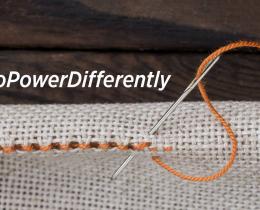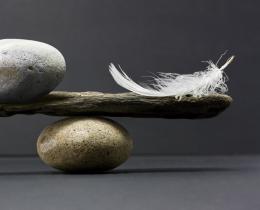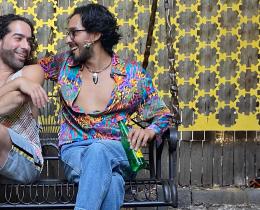The #MeToo movement caused a cultural revelation about the prevalence of sexual harassment and assault against women. #MeToo is a teachable moment wherein we can learn how to better communicate about sex and consent as individuals and as a society. We can learn to better advocate for our needs and desires, and create a culture that will hear each of us.
How Experiences Impact Communication
We need to be aware of the social constructs and trauma that can impact women's ability to express boundaries and desires clearly. An intimidating power dynamic of race, class, or professional standing can make it difficult or unsafe to disagree. A trauma response can lead to freezing up. There can be a moment of shock, disbelief, and denial when a positive encounter about which you’re excited turns ugly. Sometimes we don’t say no because it’s a calculated move to preserve safety. In addition to all these forces and more, women have often been taught affirmatively not to speak up and instead to please those around them.
Most people, whatever their gender, don't learn how to assert themselves verbally and remove themselves from situations that don't work before boundaries are crossed. I had many dates that I wasn't comfortable with in my 20s and learned, partly through these negative experiences, to be loud, clear, and confident in my yeses and nos. Wouldn’t it be wonderful if we could learn these skills without being violated or harming someone else in the process?
Take a moment and ask yourself: did you ever learn to speak up for yourself? Most of us never learned the "soft skill" of communication because it’s assumed that if we get a degree, the skills of how to relate to one another will come along implicitly. It sure didn’t work out that way for me.
Developing Skillful Advocacy
As a lawyer and political organizer, I am a highly trained advocate for individuals and movements. By my mid-twenties, I was a skillful advocate in courtrooms, to elected officials, and on stages in political campaigns. Yet somehow I had never learned to advocate for myself.
When one of my first bosses as a lawyer told me how much he liked to see me bend over and to imagine what I did with my boyfriends, I was stunned into silence and had no words to tell him how inappropriate it was.
When men ignored my words and my boundaries and accosted my body anyway, I was often shocked and speechless.
When I was offered demanding jobs by activist organizations that paid less than minimum wage per hour, I didn’t protest their story that if I were truly dedicated to the cause, I didn’t need money, even though I knew I wouldn’t be able to pay my rent and knew I deserved more.
As a high-achieving young woman from a conservative working-class background, the society I grew up in taught me to be agreeable and pleasant above all. I was taught to respect authority, that no one liked a strident, aggressive woman, and that if I followed the rules, I’d be treated fairly. I saw that successful women were expected to act as if we accidentally stumbled upon a vibrant career while being selfless, because it’s unappealing to have drive as a woman. I played by the rules. When it was time to set boundaries for myself, or make a bold request of my true desire, I didn’t know how.
Learning to Listen to Ourselves
I embarked on a decade-long journey to learn to listen to myself, tap into what I actually wanted, and express it to those around me. I uncovered my own feelings of lack of worth and self-blame (such as “I probably did something to deserve this treatment”) and embarked on a journey of unlearning them. I studied Nonviolent Communication. I trained extensively in mediation and modeled positive communication with my mediation clients. I supported other assault survivors as a sexual assault and intimate violence counselor. I embraced polyamorous relationships and communication, which required me to focus deeply on self-awareness and communication with partners and metamours.
As I advanced in my own study of communication and emotional awareness, I realized that we can learn these skills—just as we learn math and critical thinking—and they can transform our lives. Yet most of us don’t learn them. Communication is a feminized skill and as a result often devalued, yet it is the essence of how we relate to one another as humans.
I witness this transformation when I facilitate mediations with couples or families to help them communicate through the vulnerable topics that cause so much conflict when unarticulated but can be a source of great intimacy when lovingly discussed: hopes and fears about money, sex, monogamy, parenting, and death.
Shifting Society
This skill needs to extend beyond our personal lives for a true shift in society. There are many root problems that need to be addressed to fix the culture of sexual harassment and mistreatment of women. But one bold step forward would be to learn as a culture about enthusiastic consent and empowered communication. These concepts deserve to no longer be an afterthought in our education.
I look forward to a time when women are taught how to assert themselves before they experience violation, harassment, or disappointment as the stimulus. I look forward to a time when women are taught to loudly embrace our needs and desires, whether it’s the type of romance we want (or don’t want) or our professional ambition. I look forward to a time when men and people of all genders are taught to communicate openly about sexuality and relationships, honor boundaries and embrace enthusiastic consent, as part of our essential education about sexuality and human relating. We can start by teaching ourselves, learning tools that will keep us safer and happier in life, and passing those practices on to others.
To all people reading this: I hope you’ll go a step further and join me to ask whether some aspect of your own communication could be more empowered so that you can be your own best advocate for yourself, your children, your community, and your world.



